8 Best Regression Testing Tools to Use in 2025
“Software testing is not just about finding bugs, it’s about building confidence"- James Bach, renowned software tester, author, trainer, and founder of Satisfice.com.
The Best Regression Testing Tools of 2025: Top 8 Picks
Shipping fast is the new normal but it comes with hidden risks. Every new code change, even a small one, can unknowingly break existing features. Without reliable regression testing, critical bugs slip into production when you least expect them.
The challenge?
Traditional testing tools often struggle to keep pace with today’s rapid releases, multi-platform environments, and CI/CD pipelines. Manual maintenance, flaky tests, and poor scalability slow teams down instead of speeding them up.
If regression testing ever felt more like fixing problems than preventing them, you’re not alone. The right tool can change that and in this guide, we’ll break down the 8 best regression testing tools that are redefining how modern teams stay one step ahead.
What Makes a Great Regression Testing Tool in 2025?
Not all regression testing tools are built to handle the realities of modern software development. Teams today need more than just basic automation - they need smarter, faster, and more resilient solutions.
Here’s what separates a tool that slows you down from one that keeps you shipping confidently:
1. Self-Healing and AI-Driven Maintenance
Tools should automatically adapt to UI changes, have self-healing capabilities, and reduce manual script maintenance saving developers and testers hours of their time.
2. Seamless CI/CD Pipeline Integration
A great tool plugs directly into your Jenkins, GitLab, or GitHub Actions setup, triggering tests automatically with every code change, without extra scripting overhead.
3. Flaky Test Detection and Management
Flaky tests kill team trust. Modern platforms must flag unstable tests early, remove them intelligently, and provide root cause analysis without wasting cycles.
4. Parallel and Scalable Execution
Running one test at a time isn’t enough anymore. Look for platforms that allow large-scale parallelization across browsers, devices, and environments to shrink test cycles drastically.
5. Cross-Browser and Cross-Platform Coverage
Cross-browser testing is crucial today - your tool must deliver reliable results across different browsers all without redundant test scripting
6. Low Learning Curve, High Extensibility
Tools that offer intuitive onboarding yet allow deep customization work well for both fast-moving agile teams and enterprises.
As of 2025, many leading tools like DevAssure, Playwright, Katalon, and TestComplete have introduced AI stability upgrades and deeper CI/CD cloud integrations to keep pace with evolving testing needs.
Facing challenges with regression testing? Explore smarter regression testing solutions with DevAssure
🚀 See how DevAssure accelerates test automation, improves coverage, and reduces QA effort.
Ready to transform your testing process?
8 Best Regression Testing Tools
Here is a list of 8 best regression testing tools you should consider in 2025:
1. DevAssure
DevAssure is a next-generation regression testing platform built for fast-paced development teams. It uses AI-driven intelligence to minimize flaky failures, automate test maintenance, and seamlessly fit into modern CI/CD pipelines.
DevAssure also features Yaan-AI, an intelligent assistant that guides testers in real time, offering smart suggestions, surfacing potential issues, and helping optimize test cases faster. Designed for teams who want smarter test automation without slowing down release cycles.
Key Features
Key features that make DevAssure stand out:
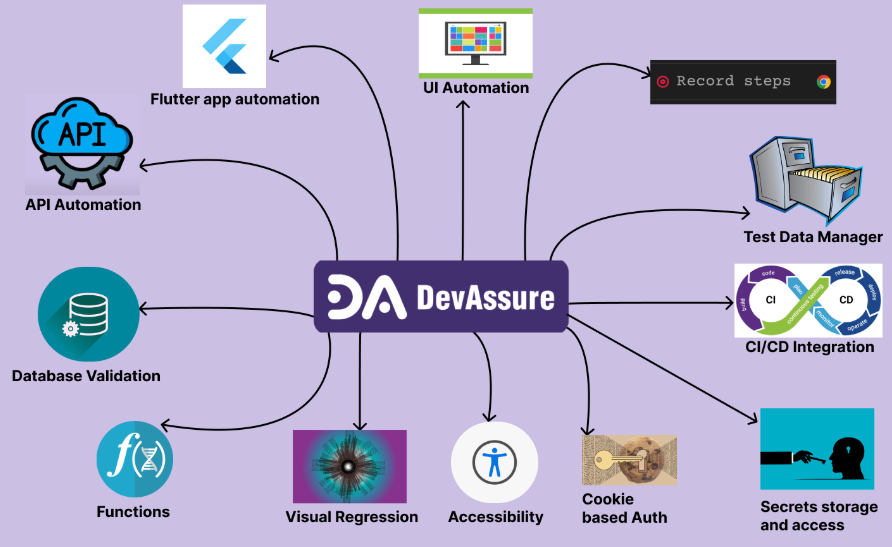
-
AI-Powered Test Maintenance: Automatically updates locators and adapts tests as the UI evolves, reducing manual intervention.
-
Smart Flaky Test Detection: Flags unstable tests proactively, helping teams isolate and fix issues before they erode trust.
-
Deep CI/CD Integrations: Native support for Jenkins, GitLab, GitHub Actions, and more with zero disruption to your existing workflows.
-
Parallel and Scalable Test Execution: Run thousands of regression tests simultaneously across browsers and platforms to accelerate feedback loops.
-
Cross-Browser, Mobile, and API Testing: Ensure complete regression coverage across web, mobile, and API layers without switching tools.
Pros
-
Minimal script maintenance through AI-led automation.
-
Built-in flaky test management and analytics.
-
Quick onboarding with intuitive UI and strong documentation.
-
Optimized for Agile, DevOps, and continuous testing environments.
Cons
-
Requires initial setup to map custom CI/CD workflows optimally.
-
Advanced features like AI prioritization might need configuration for highly customized test suites.
Best For
-
Agile and DevOps teams needing scalable, intelligent regression testing.
-
Companies adopting CI/CD pipelines who want faster, more reliable test feedback.
-
Test automation engineers and QA leads frustrated with flaky test failures.
Integrations
-
Supports seamless integrations with Jenkins, GitLab, GitHub Actions, Azure DevOps, and Circle CI.
-
Works across Selenium, Appium, Playwright frameworks for broader testing flexibility.
2. Selenium
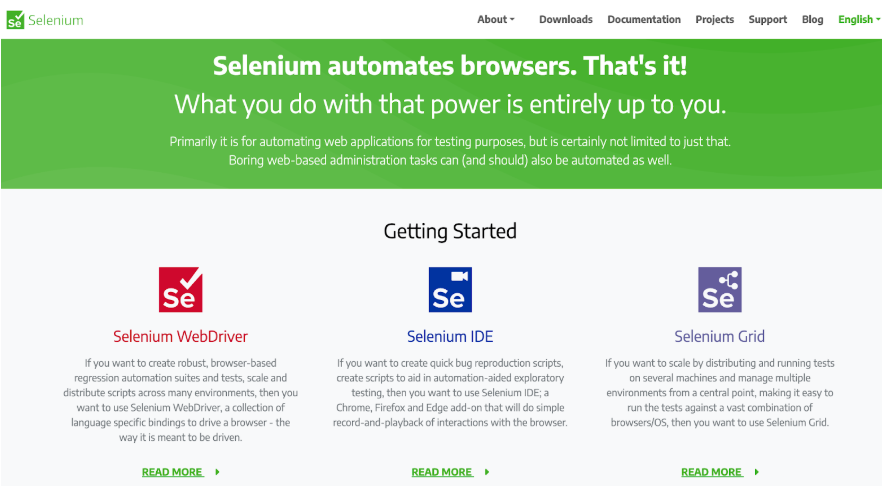
Alt Text: Selenium official website highlighting open-source browser automation tools and WebDriver components
Selenium is an open-source tool for automating web browsers. It comprises three key components- WebDriver, Grid, and IDE that let you write tests in multiple languages and run them across all major browsers.
Selenium remains a popular choice for teams needing full control over test logic and browser interactions. It excels in handling complex UI elements like dynamic tables.
Related Read: Learn how to automate tables using Selenium
Key Features:
-
Multi-Language Support: Official client bindings for Java, Python, C#, JavaScript, Ruby, and more.
-
WebDriver API: Standardized W3C interface for writing robust, browser-agnostic tests.
-
Selenium Grid: Parallel and distributed test execution across multiple machines and browser versions.
-
Selenium IDE: Browser extension for record-and-playback test creation, editing, and debugging.
-
Extensive Ecosystem: Plugins and integrations for reporting, CI/CD, cloud testing, and language-framework adapters.
Pros
-
Massive Community & Documentation: Years of tutorials, Q&A, and third-party libraries.
-
Completely Free & Open-Source: Apache-licensed with no licensing costs.
-
Highly Customizable: Fits complex or bespoke testing workflows with full code control.
Cons
-
Steep Learning Curve: Requires programming skills and manual script maintenance.
-
Flaky Test Overhead: No built-in analytics teams need extra tooling to detect and quarantine unstable tests.
-
No AI-Driven Maintenance: Lacks self-healing or auto-locator updates found in modern platforms.
Best For
-
Engineering-led teams with strong development resources.
-
Projects demanding deep customization and full control over test logic.
-
Organizations committed to open-source toolchains with no licensing fees.
Integrations
-
CI/CD: Jenkins, GitLab CI, GitHub Actions, Travis CI, CircleCI.
-
Test Frameworks: TestNG, JUnit, pytest, Mocha.
-
Cloud Testing Services: BrowserStack, Sauce Labs, LambdaTest.
3. Cypress
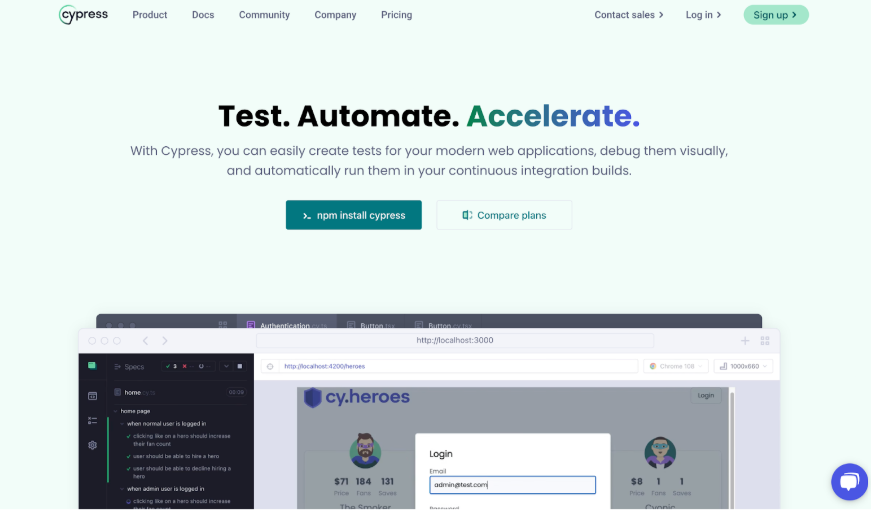
Cypress is a modern, developer-friendly testing framework built for end-to-end testing of web applications. It runs directly in the browser, giving developers real-time visibility into their tests and faster debugging capabilities.
Its architecture is especially suited for front-end teams working in JavaScript-heavy frameworks like React, Vue, or Angular.
Key Features
-
In-Browser Execution: Cypress runs inside the browser with native access to every layer of your application, allowing for faster, more reliable test runs.
-
Time-Travel Debugging: View how your app looked at each test step with automatic snapshots and built-in DevTools.
-
Automatic Waiting: No need for manual waits - Cypress automatically waits for DOM elements and API responses.
-
Network Stubbing and Control: Control and simulate API calls, response delays, and edge cases easily.
-
JavaScript/TypeScript Native: Write tests using the same language as your application — no context switching.
Pros
-
Seamless setup and fast learning curve for JavaScript developers.
-
Real-time reloading, rich debugging UI, and developer-centric workflow.
-
Strong documentation and growing plugin ecosystem.
Cons
-
Limited support for cross-browser testing (especially Safari and IE).
-
Doesn’t support multi-tab or multi-origin testing well.
-
Requires workarounds or plugins for mobile or API-only testing.
Best For
-
Front-end teams working in JavaScript frameworks.
-
Developers looking for fast feedback during local development.
-
Agile squads prioritizing UI testing over broad environment coverage.
Integrations
-
CI/CD: GitHub Actions, GitLab CI, Jenkins, CircleCI
-
Frameworks: React, Vue, Angular, Next.js
-
Plugins: Cypress Dashboard, Allure Reports, Mochawesome, Percy (visual testing)
4. TestSigma
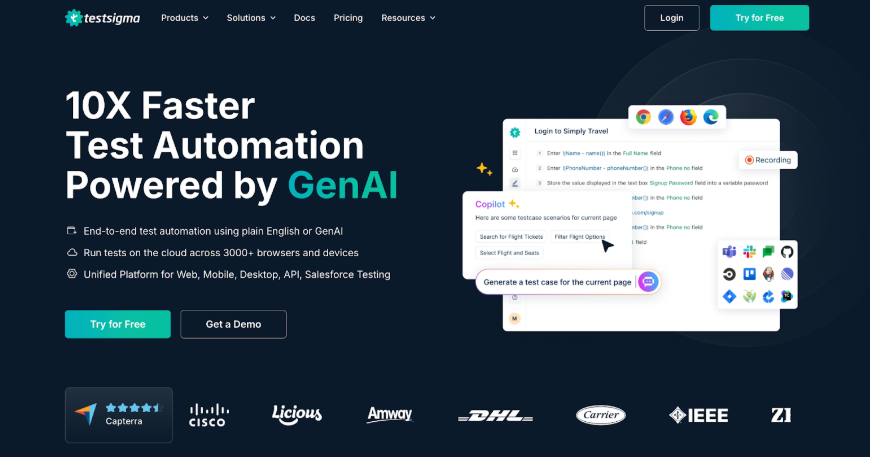
TestSigma is a cloud-based, low-code test automation platform designed to simplify regression testing across web, mobile, and APIs. It allows teams to write tests in plain English, making automation more accessible to both technical and non-technical users. Built for continuous testing environments, it supports rapid release cycles with minimal script maintenance.
Key Features
-
Natural language test scripting using NLP for easy test creation and maintenance
-
Cross-platform testing support for web, mobile (iOS and Android), and REST APIs
-
Built-in test data management and reusable test steps
-
Parallel test execution on cloud or on-premise environments
-
Real-time execution reports with screenshots, logs, and video playback
Pros
-
Great for teams with limited coding expertise
-
Unified platform for web, mobile, and API testing
-
Minimal setup with built-in device/browser infrastructure
Cons
-
Less control for teams needing highly customized scripting logic
-
Requires stable internet connectivity due to cloud-based architecture
-
Some advanced CI/CD configurations may need manual tuning
Best For
-
QA teams with mixed technical skillsets
-
Organizations adopting low-code testing practices
-
Teams needing unified automation across platforms without switching tools
Integrations
-
CI/CD: Jenkins, GitHub Actions, GitLab, CircleCI
-
Project Management: JIRA, TestRail
-
Cloud Device Labs: BrowserStack, Sauce Labs
5. TestComplete
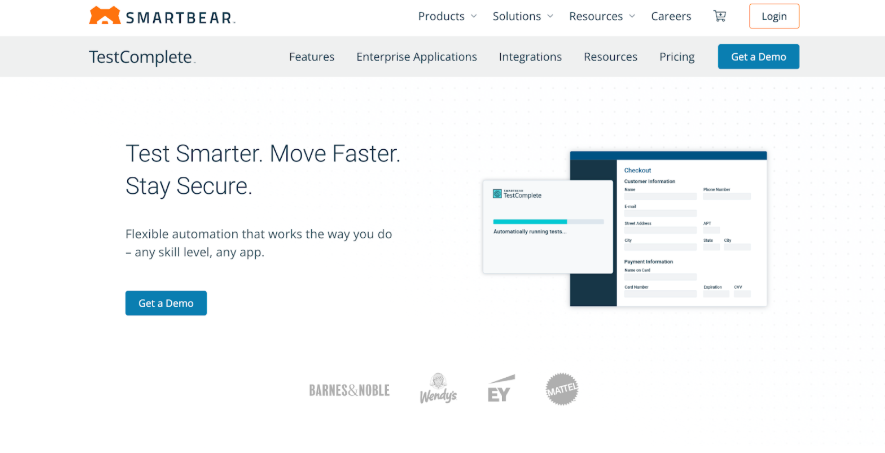
TestComplete is a powerful UI test automation tool by SmartBear that supports testing for desktop, web, and mobile applications. It provides both scriptless test creation through record-and-replay and full scripting support in multiple languages. With built-in object recognition and keyword-driven testing, it’s geared toward QA teams looking for flexibility and control.
Key Features
-
Scriptless test creation using keyword-driven and record-and-replay actions
-
Support for JavaScript, Python, VBScript, and other scripting languages
-
Object recognition powered by AI to maintain stability in UI tests
-
Cross-browser testing for Chrome, Firefox, Edge, and legacy browsers
-
Desktop and mobile testing across Windows, Android, and iOS platforms
Pros
-
Versatile support for desktop, web, and mobile apps
-
Combines scriptless and code-based approaches in one platform
-
Strong object recognition and reusable component support
Cons
-
Heavier tool requiring installation and licensing
-
Limited scalability in large CI/CD pipelines without additional setup
-
Learning curve for teams without prior automation experience
Best For
-
Enterprises needing end-to-end testing across desktop and mobile
-
QA teams combining manual testers with automation engineers
-
Projects requiring object-heavy UI testing on complex legacy systems
Integrations
-
CI/CD: Jenkins, Azure DevOps, Bamboo
-
Test Management: Zephyr, QAComplete
-
Cloud Infrastructure: BitBar (SmartBear’s cloud testing platform), BrowserStack
6.Katalon Studio
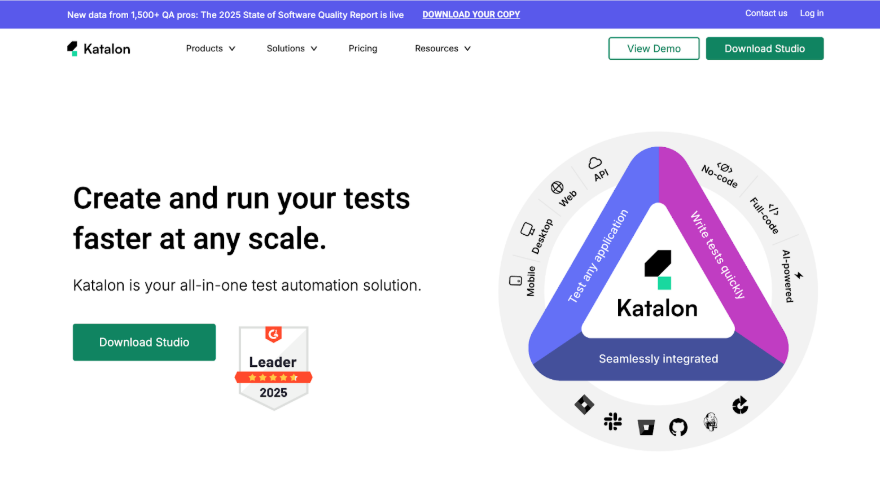
Katalon Studio is a comprehensive test automation platform designed to streamline regression testing across web, mobile, API, and desktop applications. It offers a flexible approach with no-code, low-code, and full-code options, catering to both technical and non-technical users. Built-in AI capabilities, such as self-healing and test generation, enhance test stability and reduce maintenance efforts.
Key Features
-
Multi-Platform Support: Automate tests for web, mobile (Android & iOS), API, and Windows desktop applications.
-
Flexible Test Authoring: Create tests using record-and-playback, keyword-driven, or scripting in Groovy/Java.
-
AI-Powered Self-Healing: Automatically detects and updates broken object locators to minimize test failures.
-
TestOps Integration: Centralized test management, execution scheduling, and analytics for better visibility.
-
CI/CD Compatibility: Seamless integration with Jenkins, Azure DevOps, GitLab, and other CI/CD tools.
Pros
-
User-friendly interface suitable for testers with varying coding skills.
-
Comprehensive testing solution covering multiple platforms in one tool.
-
Reduces test maintenance with AI-driven features.
-
Active community and extensive documentation support.
Cons
-
Limited customization compared to open-source frameworks.
-
Advanced features may require a learning curve for new users.
-
Performance may vary with very large test suites.
Best For
-
QA teams seeking an all-in-one automation solution.
-
Organizations aiming to reduce test maintenance overhead.
-
Teams looking for a balance between ease of use and advanced capabilities.
Integrations
-
CI/CD Tools: Jenkins, Azure DevOps, GitLab
-
Test Management: JIRA, TestRail
-
Cloud Testing: Integration with BrowserStack, Sauce Labs for cross-browser testing.
7. Playwright
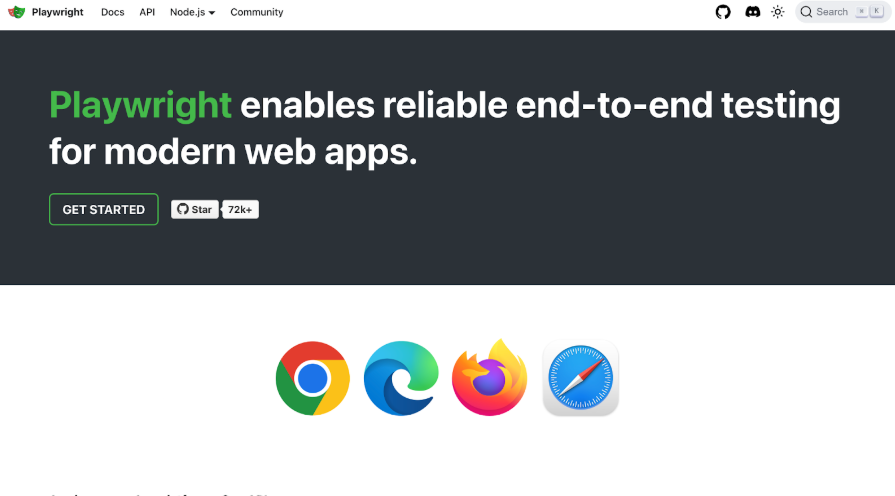
Playwright is an open-source end-to-end testing framework developed by Microsoft that supports reliable and fast regression testing across modern web applications. It enables testing on multiple browsers (Chromium, Firefox, and WebKit) using a single API, making it ideal for teams working in diverse environments.
Key Features
-
Cross-browser automation across Chromium, Firefox, and WebKit
-
Supports multiple languages: JavaScript, Python, C#, and Java
-
Built-in auto-waiting and smart retries for stable test execution
-
Headless and headed execution with detailed trace viewer for debugging
-
Supports multi-tab, multi-origin testing and network mocking
Pros
-
Fast, reliable, and highly configurable
-
Excellent for modern web apps with dynamic UIs
-
Full control over browser context, sessions, and geolocation
Cons
-
Primarily geared toward developers; less beginner-friendly for non-coders
-
Requires manual test data and reporting setup
-
Lacks a native visual UI or record-and-playback interface
Best For
-
Engineering-heavy teams comfortable with code
-
Projects requiring complex browser automation and concurrency
-
Teams wanting fine-grained control over every layer of testing
Integrations
-
CI/CD: GitHub Actions, GitLab CI, Jenkins, CircleCI
-
Test runners: Jest, Mocha, Pytest integrations
-
Plugins available for reporting, retries, and test analytics
8. LambdaTest
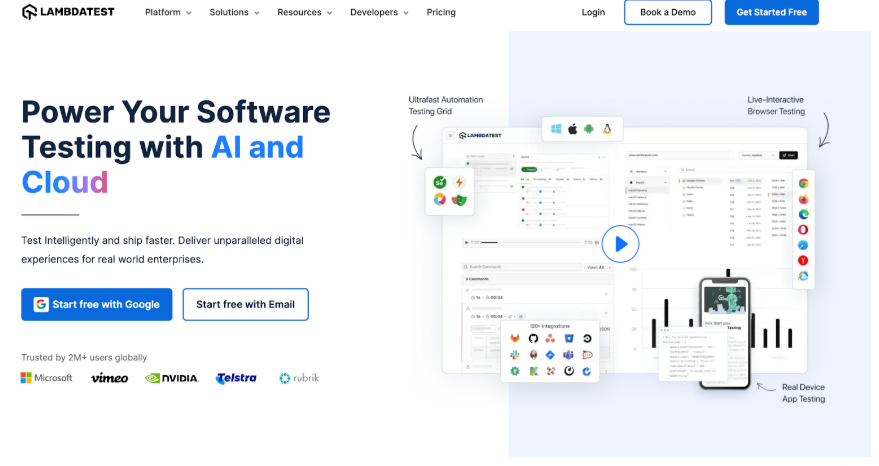
LambdaTest s a cloud-based platform offering cross-browser testing across real devices and virtual machines. It works with popular testing tools making it ideal for executing regression tests in parallel across environments without local infrastructure setup.
Key Features
-
5000+ real browsers and operating systems for cross-browser testing
-
Supports Selenium, Cypress, Playwright
-
Parallel test execution at scale with smart queue management
-
Built-in test logs, screenshots, and video recordings
-
Hosted infrastructure for mobile, desktop, and responsive testing
Pros
-
Eliminates the need to maintain internal device/browser labs
-
Seamless integration with major test frameworks and CI tools
-
Real-time debugging and test session replay
Cons
-
Test stability can vary with network conditions and session load
-
Requires test scripts to be optimized for cloud execution
-
Advanced analytics and features are gated behind higher tiers
Best For
-
Teams needing scalable, on-demand cross-browser testing
-
QA engineers using open-source frameworks looking to offload infrastructure
-
Organizations prioritizing test speed and environment coverage
Integrations
-
CI/CD: Jenkins, GitHub Actions, GitLab, Bitbucket
-
DevTools: JIRA, Slack
-
Test Frameworks: Selenium, Cypress, Playwright, Appium
| Tool | Ease of Use | AI/ML Capabilities | CI/CD Integration | Cross-Browser Support | Best For | Pricing (2025 Updated) |
|---|---|---|---|---|---|---|
| DevAssure | High | ✅ AI-powered (incl. YaaN AI) | Native + Deep | Web, Mobile, API | Agile/DevOps teams needing intelligent automation | Starter: Free, Enterprise: Custom pricing |
| Selenium | Medium | ❌ None | Strong | Web, Mobile | Engineering-led teams needing full control | Free (Open Source) |
| Cypress | Very High | ❌ None | Strong | Limited (Chrome/Edge) | JavaScript-heavy front-end teams | Starter: Free, Team: $75/mo, Business: $300/mo, Enterprise: Custom pricing |
| TestSigma | High | ✅ NLP scripting + maintenance | Built-in | Web, Mobile, API | QA teams with mixed coding skill sets | Pro: Custom Pricing, Enterprise: Custom Pricing |
| TestComplete | Medium | ✅ Object-based AI | Good | Web, Mobile, Desktop | Enterprises needing legacy app testing | Base: $4,108/year, Pro: $6,390/year, Advanced: Custom Pricing |
| Katalon | High | ✅ Self-healing | Strong | Web, Mobile, API, Desktop | Teams seeking all-in-one test coverage | Starter: $0, Premium: $167/mo (billed annually), Ultimate: Custom Pricing |
| Playwright | Medium-High | ❌ None (manual scripting) | Strong | Chromium, Firefox, WebKit | Dev teams needing deep browser control | Free (Open Source) |
How to Choose the Right Regression Testing Tool for Your Team
✅ Quick Checklist Before You Choose
🔲 Easy to learn and use
🔲 Supports cross-browser and cross-platform testing
🔲 Integrates seamlessly with CI/CD pipelines
🔲 Handles flaky tests with smart wait or AI stability features
🔲 Offers both UI and API testing support (if needed)
🔲 Scales with growing test suites and parallel execution
🔲 Fits your budget and licensing requirements
Choosing the right regression testing tool is only part of the equation. Avoiding common pitfalls is just as crucial to building a reliable testing workflow. Learn about the most common regression testing mistakes and how to avoid them.
Final Thoughts
Imagine a world where every release feels fearless. No last-minute bugs slipping into production, no frantic patching after updates. Just clean, confident deployments backed by regression tests that work silently in the background.
That world isn’t far away.
With smarter tools like DevAssure, Playwright, and TestSigma, you can build a testing strategy that scales with your ambitions. Choose not just faster automation but choose confidence in every line of code you ship.
🚀 See how DevAssure accelerates test automation, improves coverage, and reduces QA effort.
Ready to transform your testing process?
